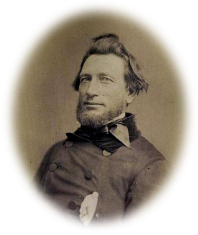15th.–I am alone to-night, and tired enough to lie and sleep for twenty-four hours, did not the scenes around call up associations which banish repose, and yet invite it. In the deep, deep woods, in a deep, deeper valley, with a mountain rising high on either side of me, and the semi-roaring babble of a large mountain brook, leaping over stones and precipices just in front of my lonely tent; the night speaks of the wildness of nature, and carries back my imagination to the times when the red man revelled here in the luxury of his mountain hunt. The song of the catydid talks to me of the rural home of my childhood, while the scream of the screech-owl right over my head awakens mingled feelings of aboriginal wildness, and of the ruins of civilization. The night is still, and over the mountain comes the strain of vocal music, with the accompaniment of a martial band, from more than a mile away, where with a regiment of Vermonters our chaplain is holding religious exercises, and “Dundee’s sacred strain,” mellowed by the distance, is in harmony with all around me. These are my nearest settled neighbors to-night, and so far away that I am outside of all their guards, yet near enough to hear the “Halt! who comes there?” of the picket, as he hails the rock, loosened from above, as it comes rushing down the mountain side. The tattoo of the night drums, too, as it comes rumbling over the mountains, and calls the soldier to his hard, but welcomed bed, awakens in the reflecting mind sad stories of the passions of men; of happy homes, deserted; of families, once united, now separated, perhaps forever; of the once freeman, to whom the dungeon now denies all hope of liberty again; of a country, once a unit, which held the world at bay, now an object of the ridicule or pity of nations which but a few short months before trembled at her power; of reflections which, I fear, must convince that “war is the normal condition of man.” There were threats of an attack on us yesterday and to-day. My hospital was in an exposed position, and my sick must be moved. At dark I commenced moving to a more secure place; selected this beautiful ravine ; got my tents here, but not deeming it best to disturb the sick by moving them in the night, am here alone to take care of my tents and stores. And how beautifully the moon sheds its reflections over this quiet little valley, and brightens, as with myriads of diamonds, the ripplings of the little mountain streams! How deliciously sweet the fresh odor of the clean grass, untainted by the stench of the camp. But hark! I hear at this moment, from Fort Corcoran, “the three guns,” a signal of approaching danger, and in another moment the “long roll” may summon us to scenes of trouble. I am still stubborn in the belief that the enemy is only making a feint, and that we shall have no fight here. The long roll does not call me. The “three guns” must have made a false alarm, and so I will retire and “bid the world good-night.”
“My hospital was in an exposed position, and my sick must be moved.”–Journal of Surgeon Alfred L. Castleman.

• • • • • • • • • • • • • • • • • • • • • • • • • • • • • • • • •